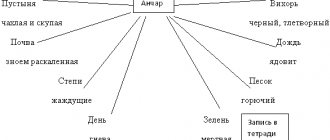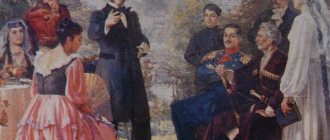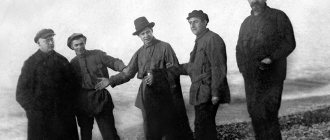Central characters
The central character of M. Yu. Lermontov’s poem “I will not humiliate myself before you...” is a poet in love who sacrifices the most precious things, creativity and inspiration, for the sake of his beloved. “Perhaps I took away those moments that passed at your feet from inspiration,” he says to the girl.
Her love turned out to be an illusion, her promise a lie. But the lyrical hero is a proud and strong man. “I will not humiliate myself before you,” he turns to his former lover.
He regrets that he succumbed to the charm of the flighty coquette and spent precious time on her, which he could devote to creativity.
History of creation
The poem “I will not humiliate myself before you” is connected in a very sad love story for Lermontov. For a long time it was unclear to whom this work was dedicated, but over time it became clear that the poet wrote it during a period of a painful break with Natalya Ivanova, whom he carefully courted.
The girl treated the young man very favorably; she accepted the poems dedicated to her, but it is not known whether they were followed by a declaration of feelings. And yet, from the country estate where they met, the sixteen-year-old poet returned happy. However, his meeting with Natalya in Moscow disappointed him - she turned out to be a flighty coquette. Lermontov attended the same balls as her, each time seeing the same picture: his beloved flirting with gentlemen, each time with a different one, showing absolutely no interest in him.
This behavior deeply outraged the young man, and he broke off the relationship, but continued to deeply feel his resentment. In the summer of 1832, he wrote the poem “I will not humiliate myself before you,” presumably sending a handwritten version of it to the anemone. It came into print only in 1859, almost two decades after the poet died in a duel.
Plot
The storyline of the poem emerges from the monologue of the lyrical hero, who addresses his former lover. From his memoirs we learn about how much and devotedly the young man loves his chosen one.
“I hated the whole world so that I could love you more,” he says. But the reader understands from the first line that the novel had no continuation.
The storyline of the work is built on a description of the feelings and experiences of the lyrical hero. Everything has already happened: love, betrayal, disappointment, pain.
The poet's mood changes from line to line. From reproaches to his beloved (“Know, we are strangers from now on”), he moves on to regrets about lost opportunities (“I would give the world a wonderful gift”).
Then he tries to pull himself together, reviving his sense of self-worth (“I will not become a slave”).
At the end of the poem, the lyrical hero plans his future. To cope with mental pain, he dreams of going to foreign lands, enjoying himself and “cheating shamelessly.” He no longer believes in love.
Analysis of Lermontov’s poem “K* (I will not humiliate myself before you...)”
In the summer of 1830, 16-year-old Mikhail Lermontov, while relaxing on a country estate, met Natalya Ivanova, the daughter of a famous Russian writer at that time. The girl captivates him not only with her beauty, but also reciprocates the young poet’s feelings. After an unsuccessful romance with Ekaterina Sushkova, who mercilessly ridiculed her young admirer, Lermontov again feels the taste of life. He is fascinated by his beloved and devotes his first timid poems to her, in which he hints at his feelings. Now it is difficult to establish for certain whether the young people had a love affair and whether they swore an oath of allegiance to each other, but Lermontov returned to Moscow inspired and completely cured of despondency.
It is known that the poet and his chosen one met several times at balls during 1830, which became the reason for Lermontov’s deep disappointment. He became convinced that he was just a passing hobby for Natalya Ivanova, and at parties she preferred to spend time in the company of more successful gentlemen, with whom she openly flirted. However, the final break between the lovers occurred in the summer of 1831. It is no longer possible to establish for certain what exactly happened between Lermontov and Ivanova. However, after returning to Moscow, the 17-year-old poet unexpectedly writes a play called “Strange People”, the prototype of the main character in which is his chosen one. According to the plot, a girl who has sworn an oath of fidelity to her beloved subsequently takes back her words and gives preference to another. It is likely that the same thing happened in real life, and Natalya Ivanova simply became interested in another young man.
More on the topic: Mikhail Lermontov ~ I want to live! I want sadness...(+ Analysis)
One way or another, in the winter of 1832, 5 months after the fateful events, Mikhail Lermontov creates the poem “K* (I will not humiliate myself before you...),” a handwritten version of which he sends to the one he loved. In this work, the author seems to draw a line under this short novel, emphasizing: “we are strangers from now on.” Explaining his decision to finally break off relations with his beloved, the poet notes that he made too much of a sacrifice in the name of high feelings for someone who does not deserve it. “And the whole world hated you so that it could love you more,” the poet notes. At the same time, Lermontov considers the year and a half that this novel lasted to be irretrievably lost for poetry, since he indulged in pipe dreams instead of honing his literary style.
The poet considers himself deceived and insulted. But he blames this not only on his beloved, who was not at all what she wanted to appear to be. First of all, the author calls himself a “madman,” because he was led by his own feelings, which overshadowed the voice of reason . However, insight came quickly enough, and Lermontov wishes only one thing for his chosen one - “dream of finding love in another.”
As in the play, the poet directly indicates that the reason for the break in relations was that Natalya Ivanova preferred another young man to him. And this discouraged Lermontov so much that he finally became disillusioned with the fairer sex, asking: “Is it possible to respect women when an angel cheated on me?” However, from now on, the poet no longer intends to indulge himself in illusions and remain in delusions, believing that it is better to put an end to this love story than to sacrifice freedom for the sake of the illusion of happiness.
No one in the poet’s circle knew about the romance between Lermontov and Ivanova, so for a long time the poems marked with the initials of Natalya Ivanova, which in a year and a half totaled more than 30 pieces, remained the poet’s posthumous secret. Only in the middle of the last century did the literary critic Irakli Andronnikov manage to decipher the name of the mysterious stranger with whom Lermontov was in love, who shed light on the tragic love story of the young poet.
Artistic originality of the work
The artistic originality of the poem is associated with the technique of gradation.
The author’s excitement gradually increases, culminating towards the end in a remark filled with indignation and indignation: “Did you know the price of such a soul? You knew - I didn’t know you!”
The text of the poem is filled with exclamatory sentences and rhetorical questions that convey the emotional intensity of the work. The absence of the usual division into stanzas helps the reader to follow the author’s thoughts without stopping.
Composition
The entire poem is a letter to a flighty girl, which is a complete work. From the first lines, the lyrical hero proudly declares that from now on he is free from his feelings. He further develops the bitter thought that the time spent at the feet of one who did not deserve such worship could have been devoted to creativity - and he deeply regrets that he wasted it on such empty activities as courtship.
Continuing to tell his former lover about his disappointment, he reproaches her for infidelity, and then points out how she has changed the young man, who was previously sensitive to feelings: now he will simply enjoy and swear to everyone in passion, receiving pleasure, but not giving it to anyone else my heart.
Concluding the work, Lermontov talks about how he was ready to do anything for the sake of his beloved, and throws out the bitter “you knew - I didn’t know you!”
The poem is written as one excited monologue without division into stanzas.
Mikhail Yuryevich used iambic tetrameter and cross rhyme for “I will not humiliate myself before you,” which helped him simply and sincerely convey the emotions of the lyrical hero, convey feelings even to the most callous heart.
Means of artistic expression
The main idea of the poem is conveyed by means of artistic expression:
- the strength of feelings is expressed by vivid epithets (“heavenly thoughts”, “wonderful gift”, “insidious betrayal”);
- tension of the situation - unusual metaphors (“hello..., reproach has no power over my soul”, “I gave my soul”, “I sacrificed years to your smile and eyes”);
- the depth of suffering is expressed in hyperboles (“to call the whole world to battle”, “in passion I will swear to everyone”, “I have hated the whole world”);
- universal human significance - images and symbols (angel, soul, immortality).
Theme, idea and composition
The poem was written in 1832. It marked the final separation from Natalya, although the relationship started well. The theme of the work is unrequited love . No one knows for sure whether Mikhail explained his feelings, but he definitely sent a draft letter to his beloved.
It is believed that the poet accuses beautiful girls of frivolous behavior. The written expression reveals obvious resentment and disappointment. Lermontov is thinking about whether it is possible to trust women in principle if one of their best representatives could not keep her word.
For the poet, the beloved is already a complete stranger, for whom there are no excuses. He also proudly says that he will not humiliate himself in front of her.
The genre of the message is elegy . The poet expresses his philosophical reflections extremely emotionally.
The work is based on oppositions. Lermontov contrasts delusions with Nadezhda and betrayal with love. But the most listened-to antithesis is “I” and “you”. This can be seen in almost every line. The hero is hopelessly trying to understand why the girl didn’t show herself right away. He stops believing her and reproaches her for hypocrisy and cunning.
Lexical devices and lyrical hero
To increase the tragedy, Lermontov uses hyperbole. To convey his condition, the author of the poem used the following epithets:
- tenderly promised;
- wonderful gift;
- insidious treason;
- We are strangers.
The analysis shows that the selected artistic means convey emotion as correctly as possible. For greater effect, the author uses exclamations and rhetorical questions. This is a lyrical monologue pronounced in one breath. The poem is written in iambic pentameter.
The lyrical hero of the work is filled with love and despair. He fully demonstrated his feelings, but his beloved only rewarded him with “insidious betrayal” in response.
The hero is proud and ready for new love. His heart says goodbye to the past and strives for the future.
For M.Yu. Lermontov's love is one of the strongest human feelings and the most natural manifestation of human relationships.
Love, like poetry, takes possession of a person’s entire being, and all his internal forces come into motion. Lermontov was naturally amorous, ardent and very sincere. He idolized the chosen one of his heart, dedicated beautiful poems to her, and surrounded her with attention and tender care. But it often happened that the poet’s love was broken by the coldness, misunderstanding and even betrayal of his beloved.
That is why in the intimate lyrics of M.Yu. Lermontov has very few bright, joyful moods, those “wonderful moments” that were sung by Pushkin. Most often, Lermontov talks about loneliness, unrequited love, and the betrayal of a woman who did not appreciate the sublime feelings of a friend.
The poem “K***” (“I will not humiliate myself before you...”) is dedicated to Natalia Fedorovna Ivanova, to whom the poet dedicated more than twenty poems during the two years of their stormy romance.
Natalya Fedorovna was the daughter of the famous writer Fyodor Fedorovich Ivanov at that time. The poet met her in the summer of 1830 at the dacha of his relatives, the Stolypins. It was not far from Moscow, on Klyazma. Ivanova’s first poetic message was full of joyful hopes, happy expectations, and admiration for young beauty:
A warm spring day was shining through the window; and at the window sat a maiden, tender-faced, With eyes full of soul and life.
But the period of love and open reciprocity was short, so short that after a short period of time the poet will say: “I was flattered by love at first...”
In the summer of 1831, there was a strong rift in the relationship between Mikhail Yuryevich and Natalia Fedorovna. Something terrible happened. Returning to Moscow after his “initial dacha holiday,” the poet begins to write a play dedicated to the events that shocked him. The title of the play is “Strange Man.” In it, under the name of Vladimir Pavlovich Arbenin, Lermontov introduces himself, under the name of Natalia Fedorovna Zagorskina - Natalia Fedorovna Ivanova. Zagorskina cheats on Arbenina. Thoughtlessly preferring his friend Belinsky, she decides to marry him. She begins to show more and more coldness towards Arbenin, neglecting his passionate feelings.
The plot of the drama sheds light on what happened in the relationship between the poet and Ivanova. Lermontov had a hard time breaking up with his beloved girl, to whom he confided his secrets and dreams. And so in 1832, six months after the fateful events, saying goodbye forever to “N.F.I.” - this is how he often titled poems dedicated to her, the poet writes the last poetic message to his beloved:
I will not humiliate myself before you, Neither your greeting nor your reproach has power over my soul. Know that we are strangers from now on...
The hero regrets that in vain I “sacrificed years” to the insincere feelings of a girl who was simply flirting with him. The lyrical hero loves strongly and sacrificially, but he will not allow him to be treated condescendingly:
I'm proud! - sorry! Love another, Dream of finding love in another; I will not become a slave to anything earthly.
Just like A.S. Pushkin in his famous “I loved you...”, M.Yu. Lermontov wishes his beloved joy and happiness with her other chosen one. But he no longer intends to believe women’s coquetry; he has lost faith in the sincerity of love confessions. The poet is ready for revenge:
From now on I will begin to enjoy And in passion I will begin to swear to everything; I will laugh with everyone, but I don’t want to cry with anyone...
But the frustration and anger of a deceived feeling give way to the sadness of loneliness and regret:
I was ready for death and torment And to call the whole world to battle, So that your young hand - Madman! – shake again!
The poem is not divided into stanzas. This creates the effect of excited, non-stop speech - confession. The author uses vivid epithets and metaphors that help him convey a complex state of mind (“heavenly thought”, “insidious betrayal”, “wonderful gift”, “I sacrificed years to your smile and eyes” - synecdoche). The composition is based on the technique of opposition: “love” - “betrayal”, “hope” - “delusion”, “hello” - “reproach”.
The poem is written in iambic pentameter using pyrrhic and spondee. The abundance of exclamatory sentences and rhetorical questions reflects the confused, agitated nature of the narrative.
After this poem, Lermontov never dedicated poems to N.F. Ivanova. Oblivion became a kind of revenge for broken dreams and hopes. Only later, a year later, Lermontov would write in his diary and in N.F.I.’s album:
What can a short meeting bring me in consolation? The hour of inevitable parting has come, and I said: forgive me. And a crazy verse, a farewell verse I threw into your album for you, Like the only sad trace that I will leave here.
The poem amazes with its emotionality, sincerity, and high moral sense. It is a pearl of the intimate lyrics of the great poet.








